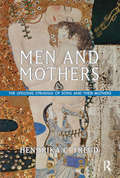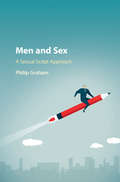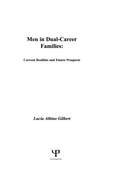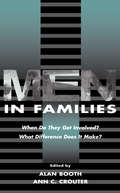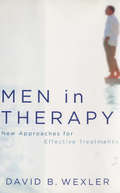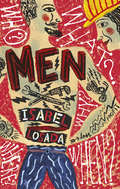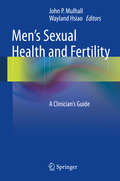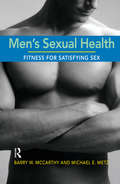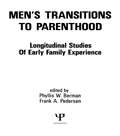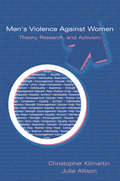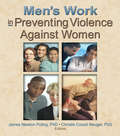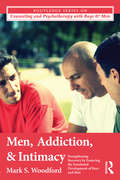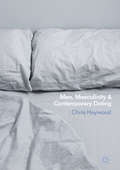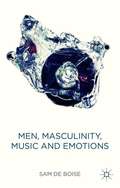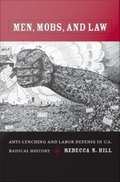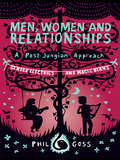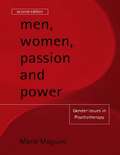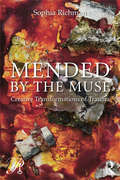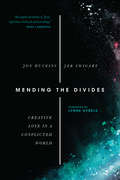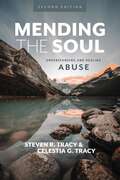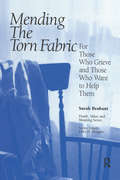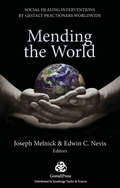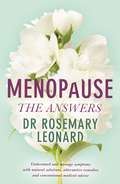- Table View
- List View
Men and Mothers: The Lifelong Struggle of Sons and Their Mothers
by Hendrika C. FreudNot all men vie with their fathers for the love of their mothers. In some families the mother becomes the central figure for her son - the father is excluded (or excludes himself) and does not come between mother and son. The main thesis of this book - using clinical vignettes and quotes from the work of Marcel Proust to illustrate the author's points - is that in these cases fantasies of matricide replace patricide. Men develop their male gender identity by being permitted to separate from their mother early on, but when a man does not resolve his infantile tie to his mother he risks remaining in a passive and/or dependent position towards her. Over-identification with the mother might ensue, hampering masculine development. Mothers who seek emotional support by binding their sons too closely can become seductive towards them. The child is inclined to try to satisfy the emotional needs of his mother, and he fears rejection if he asserts his independence instead of complying.
Men and Sex: A Sexual Script Approach
by Philip GrahamMen and Sex provides a comprehensive yet accessible account of male sexuality by using the theoretical concept of the 'sexual script' to illuminate different aspects of men's sexual behaviour. Graham begins by discussing different theories of sexuality, before providing a more detailed description of sexual script theory. This proposes how male sexual behaviour can be explained as a result of cultural influences modified by individual experience and personality as well as by interaction with others. Individual chapters detail the development of sexual scripts in childhood and adolescence, masturbation, cultural influences on sexuality, heterosexual behaviour, variations and problems in sexual functioning, homosexual behaviour, transsexualism, procreative sex, coercive sexual behaviour, the impact of physical and mental health problems on sexuality, and sexuality and pornography. The concluding chapter looks at the future of male sexuality. The book makes a valuable contribution to the burgeoning literature on masculinity studies.
Men in Dual-career Families: Current Realities and Future Prospects (Vocational Psychology Series)
by Lucia Albino GilbertFirst published in 1985. Routledge is an imprint of Taylor & Francis, an informa company.
Men in Families: When Do They Get involved? What Difference Does It Make? (Penn State University Family Issues Symposia Series)
by Alan Booth Ann C. CrouterRecently, the roles of fathers and husbands in families have been recognized as important issues. They appear in legislation aimed at deadbeat dads, social movements including the Million Man March and Promise Keepers, in the development of advocacy groups, and in think tanks. Therefore, contemporary research on men in family relationships has very mixed results. Some studies show that fathers have small effects on child development and in preventing antisocial behavior, whereas others suggest no effects. Other research claims that the primary importance of men in families is in their role as providers. Although some studies state that the husbands' and fathers' most vital work occurs in new families, others indicate that it is when their offspring reach adolescence. Confusing the issue even further, labor market trends predict that men's family roles may diminish. Based on the presentations and discussions from a recent national symposium on men in families held at The Pennsylvania State University, this book addresses these issues. This is the only book that deals with men's involvement in families in a comprehensive way. Although several books focus on fathers alone or on a broader family perspective, this is the first book that deals with a variety of family roles on an interdisciplinary basis. Although most of the writers are psychologists or sociologists, there are key figures in history and anthropology who also make important contributions. As such, this volume will be useful to scholars, students, policy specialists, and family program administrators.
Men in Therapy: New Approaches for Effective Treatment
by David B. WexlerHow to do better, more effective therapy with men. Cultural norms and assumptions color the male experience of psychotherapy, and the traditional notions of masculinity to which many men still cling are, in many ways, antithetical to the tenets and goals of therapy. As a result, even the experienced therapist may find him- or herself struggling when working with male clients. In Men in Therapy, therapists are offered a number of methods for countering men's general reluctance to open up emotionally or fully engage in therapy. Of course, men cannot be reduced to a single, monolithic group; rather, they start therapy due to a wide range of needs, and come from a wide variety of backgrounds. Therefore, individual chapters are devoted to the treatment of men in relationships, men suffering from depression, fathers, men who abuse women, and men of color. In each case, Wexler provides an informative overview of the issues unique to each group, sound advice, and commonsense methods for treating each of these groups effectively, nonjudgmentally, and professionally.
Men!: Forget the fiction! Where are the interesting and available men?
by Isabel LosadaFast, hard-hitting, funny and honest, this is the book that answers the question that all women discuss every day: 'Where are the interesting and available men?' Forget the fiction. This is not self help or a dating manual - This is 'Men!' - controversial, sassy and very entertaining - Michael Moore meets real life Bridget Jones.Bestselling author Isabel Losada throws herself (literally) into all male environments to learn about how different 'Men!' are from women. From learning to be a plumber and riding a Harley to interviewing psychologists and dating hosts, every page will have readers smiling and learning about 'Men!' and about themselves. How do you define an 'interesting' man? (or women?) How are male and female brains different? What do the richest men in the city and the builders on the building sites want of women? This is not a book for women who think that finding a man is the solution to their problems; rather it is an intelligent, controversial and often hilarious journey through modern life and relationships by a unique and well-loved author.
Men's Accounts of Boarding School: Sent Away
by Margaret Laughton, Allison Paech-Ujejski, Andrew PattersonMen’s Accounts of Boarding School is a collection of writings by men about their childhood experiences of being sent away to boarding school. In these narratives, the men discuss their feelings through their years at school and how this has affected them in adulthood. They give individual views of how living away from home, in an institutional setting, has impacted on their lives. Much has been written about the adverse effects of early separation and broken attachments, and these men illustrate this research in their accounts. This book will be insightful and useful reading for therapists working with the issues of Boarding School Syndrome, as well as former boarders.
Men's Sexual Health and Fertility
by John P. Mulhall Wayland HsiaoIn the last decade, much of the clinical interest in the field of infertility has focused on advancing reproductive techniques and has often under-appreciated the role that male sexuality plays in reproductive problems. Male sexual function is an integral part of reproduction, and the treatment of sexual dysfunction is an important component for any couple seeking fertility. In some cases, treatment of sexual dysfunction may obviate the need for more invasive cures through advanced reproductive techniques. Thanks to recent clinical and scientific advances in male sexual medicine, the management of men's sexual dysfunction is often more effective and less invasive than how it was historically described. Men's Sexual Health and Fertility is the only resource that focuses on the interplay and interconnections between male sexual dysfunction and male factor infertility, gathering insightful data from a panel of experts in male sexual medicine for clinicians who treat couples with fertility issues due to male sexual dysfunction. Chapters discuss advances in the field of men's sexual medicine, including the latest treatment for erectile dysfunction, the most up-to-date understanding of the physiology and pathophysiology of ejaculation, and the growing body of evidence that low testosterone and male infertility are intimately related. As such, this book provides important information in order to be able to better understand the link between sexual dysfunction and infertility and, most importantly, to better treat male sexual dysfunction in the infertile couple.
Men's Sexual Health: Fitness for Satisfying Sex
by Barry W. McCarthyMen's Sexual Health is a breakthrough book about vital and satisfying male sexuality. It presents a new model of male and couple sexuality, which establishes positive, realistic expectations of pleasure and satisfaction, as opposed to the self-defeating traditional demand for perfect intercourse performance. Men and couples who adopt this approach will enjoy sexuality throughout the lifespan. The authors introduce the new "smart thinking," focused on an integration of mind and body, which confronts the myths and misunderstandings which limit male sexual growth. The book will help men and women understand how to pursue sexual and relational health, overcome sexual problems, with the goal of greater acceptance and satisfaction. The book advocates for positive, realistic Good-Enough Sex which will significantly enhance male and couple sexual satisfaction.
Men's Transitions To Parenthood: Longitudinal Studies of Early Family Experience
by Phyllis W. Berman Frank A. PedersenFirst published in 1987. Routledge is an imprint of Taylor & Francis, an informa company.
Men's Violence Against Women: Theory, Research, and Activism
by Christopher Kilmartin Julie AllisonThis text offers a balance of clinical and social psychological theory and research, as well as prevention and intervention techniques with the purpose of understanding and ultimately ending gender-based violence. The authors address several forms of violence, including rape, intimate partner violence, stalking, and sexual harassment in a contempor
Men's Work in Preventing Violence Against Women
by Christie Cozad Neuger James Newton PolingPromote effective partnerships between men and women to end domestic violence! Men's Work in Preventing Violence Against Women examines the experiences of 12 practicing counselors who call on their religious training to form partnerships between men and women that promote an end to domestic violence. In both religious and secular settings, the bulk of the work done to end violence against women is done by women-survivors who have become activists and advocates who have been touched by the witness of survivors. Motivating and educating men to share the everyday work of domestic violence shelters, rape crisis counseling, and abuse prevention is essential. This book challenges traditional images of masculinity, exploring effective-and ineffective-methods of helping men face their own sexism and change their behavior toward the goal of ending domestic violence. Each contributor to Men's Work in Preventing Violence Against Women approached the concept of man/woman partnerships working to end domestic violence and sexual assault with the following questions in mind: In your experience and social world have you seen creative partnerships between men and women that made a difference? Have you seen men in counseling struggle to change their views on gender in order to become reliable allies in the fight to end violence against women? How can religion become a resource for men working to become allies with women? What strategies can men use to help end violence against women? Men's Work in Preventing Violence Against Women includes contributions from Paul Kivel, cofounder of the Oakland Men's Project and of Gvarim: Bay Area Jewish Men Against Violence; David Livingston, author of Healing Violent Men: A Model for Christian Communities; Al Miles, author of Domestic Violence: What Every Pastor Should Know; and Richard Wallace Jr., editor of the Journal of Ministry in Addiction & Recovery (Haworth). Each essay presents practical and theoretical ideas, guidelines for partnerships, and insightful information on sexual and domestic violence. Topics addressed include: Jewish male violence holding Christian men accountable for domestic violence shared experiences of batterers and the people who treat them premarital preparation the dynamics of power in pastoral care engaging Scripture with male abusers helping men become pro-feminist Men's Work in Preventing Violence Against Women is an essential resource for counselors, social workers, clergy, laypersons, and anyone else working to end domestic violence and sexual abuse against women.
Men, Addiction, and Intimacy: Strengthening Recovery by Fostering the Emotional Development of Boys and Men (The Routledge Series on Counseling and Psychotherapy with Boys and Men)
by Mark S. WoodfordIn the substance abuse and addiction treatment realm, males outnumber females two to one. While gender-issues are seen as a key element of women’s treatment, the acknowledgement that males are "gendered beings" who have lived lives full of male-specific developmental challenges is often overlooked. This text takes a developmental lifespan approach to examine the neurobiological and psychosocial factors associated with substance use disorders for males, specifically in relation to emotional growth and awareness, and how these areas, in turn, affect the development of healthy relationships. Theoretical concepts from the field of interpersonal neurobiology, the psychology of boys and men, and the substance abuse and addiction literature are interwoven with practical clinical examples to help elucidate how the notion of fostering emotional development can strengthen the treatment and recovery processes with boys and men. Relevant case examples are included that illustrate work with males of all ages and address a variety of factors associated with culture, ethnicity, race, religion, and sexual orientation. Mental health practitioners will find this a valuable guide to understanding male development in relation to substance use and abuse and providing more comprehensive, gender-responsive counseling and assessment practices.
Men, Masculinity and Contemporary Dating
by Chris HaywoodAt a time when traditional dating practices are being replaced with new ways to meet potential partners, this book provides fresh insights into how are men responding to new ways of dating. Drawing upon original research, this book examines a wide range of contemporary dating practices that includes speed dating, holiday romances, use of dating apps, online sex seeking and dogging. It reveals the ways in which men draw upon traditional models of masculinity to negotiate these changes; but also, the extent to which men are responding by elaborating new masculinities. Through an investigation of the dynamics of heterosexuality and masculinity, this book highlights the importance attached to authenticity, and the increasing marketization and commodification of dating. It argues that in a post-truth world, men must also come to terms with a post-trust dating landscape. Combining rich empirical material with keen theoretical analysis, this innovative work will have interdisciplinary appeal for students and scholars of sociology, media studies, cultural studies, and gender studies.
Men, Masculinity, Music and Emotions
by Sam BoiseThis book looks at the historic and contemporary links between music's connection to emotions and men's supposed discomfort with their own emotional experience. Looking at music tastes and distaste, it demonstrates how a sociological analysis of music and gender can actually lead us to think about emotions and gender inequalities in different ways.
Men, Mobs, and Law: Anti-Lynching and Labor Defense in U.S. Radical History
by Rebecca N. HillIn Men, Mobs, and Law, Rebecca N. Hill compares two seemingly unrelated types of leftist protest campaigns: those intended to defend labor organizers from prosecution and those seeking to memorialize lynching victims and stop the practice of lynching. Arguing that these forms of protest are related and have substantially influenced one another, Hill points out that both worked to build alliances through appeals to public opinion in the media, by defining the American state as a force of terror, and by creating a heroic identity for their movements. Each has played a major role in the history of radical politics in the United States. Hill illuminates that history by considering the narratives produced during the abolitionist John Brown's trials and execution, analyzing the defense of the Chicago anarchists of the Haymarket affair, and comparing Ida B. Wells's and the NAACP's anti-lynching campaigns to the Industrial Workers of the World's early-twentieth-century defense campaigns. She also considers conflicts within the campaign to defend Sacco and Vanzetti, chronicles the history of the Communist Party's International Labor Defense, and explores the Black Panther Party's defense of George Jackson. As Hill explains, labor defense activists first drew on populist logic, opposing the masses to the state in their campaigns, while anti-lynching activists went in the opposite direction, castigating "the mob" and appealing to the law. Showing that this difference stems from the different positions of whites and Blacks in the American legal system, Hill's comparison of anti-lynching organizing and radical labor defenses reveals the conflicts and intersections between antiracist struggle and socialism in the United States.
Men, Women and Relationships - A Post-Jungian Approach: Gender Electrics and Magic Beans
by Phil GossThis book offers Jungian perspectives on social constructions of gender difference and explores how these feed into adult ways of relating within male-female relationships. Phil Goss places this discussion within an archetypal context drawing on the fairy tale Jack and the Beanstalk to consider the deep tension in western culture between the transcendent masculine and the immanent feminine. Offering both developmental and socio-cultural frameworks, areas of discussion include: the use of story and myth to understand gender Jungian and post-Jungian approaches: updating anima/animus working clinically with men, and with women the developmental pathways of gender difference power relations between men and women in the home. Men, Women and Relationships – A Post-Jungian Approach will be a valuable resource for all those with an interest in analytical psychology including psychotherapists, psychoanalysts and counsellors, as well as those in the broader fields of social work and education who have an interest in gender difference and identity.
Men, Women, Passion and Power: Gender Issues in Psychotherapy
by Marie MaguirePsychoanalytic theory has often found it difficult to come to terms with issues of power within gender relations. Both theory and clinical practice have tended to replicate the cultural idealization of men and the denigration of women, splitting masculinity and femininity between the sexes in a way which depletes both. In Men, Women, Passion and Power, Marie Maguire argues that it is only when psychoanalysis integrates the male and female in its theorizing that the possibility of a more balanced and fluid psychological relation between the sexes will emerge. Making detailed use of case material, she introduces the reader to the contemporary debates about sexuality and explores them with sensitivity from a feminist viewpoint. Looking at such topics as false memories of sexual abuse, perverse sexuality, homosexuality, pornography and bulimia, she shows how current thinking is trammelled by sexist, homophobic and culturally biased assumptions about gender identity and sexual orientation. She concludes that only when a feminist perspective has been truly integrated into theory will the psychoanalytic project realize its full radical potential. This edition first published in 2004. Routledge is an imprint of Taylor & Francis, an informa company.
Men, Women, Passion and Power: Gender Issues in Psychotherapy
by Marie MaguireThis completely revised edition of Men, Women, Passion and Power offers a new critique of conventional notions of masculinity and femininity. Contemporary psychoanalytic debates about sexuality are explored, revealing how the cultural idealisation of men is replicated in theory and clinical practice. Illustrated with use of detailed and vivid case material, this book demonstrates that it is only when the feminist perspective has been truly integrated into theory that the psychoanalytic project will realise its full radical potential. Subjects covered include: * The power of female sexuality * Race, class and sexuality * The fragility of male sexual identity * Envy between the sexes. Marie Maguire argues that examining these issues and gaining an awareness of how our assumptions are influenced by social inequalities can enrich the psychotherapeutic process and result in a more balanced psychological relation between the sexes. Men, Women, Passion and Power will be of great interest to psychotherapists, psychoanalytic practitioners and anyone with an interest in the integration of a feminist perspective into psychoanalytic theory.
Mended by the Muse: Creative Transformations Of Trauma (Psychoanalysis in a New Key Book Series)
by Sophia RichmanMended by the Muse: Creative Transformations of Trauma is an in-depth exploration of the relationship between trauma and creativity. It is about art in the service of healing, mourning, and memorialization. This book addresses the questions of how artistic expression facilitates the healing process; what the therapeutic action of art is, and if there is a relationship between mental instability and creativity. It also asks how self-analysis through art-making can be integrated with psychoanalytic work in order to enrich and facilitate emotional growth. Drawing on four decades of clinical practice and a critical reading of creativity literature, Sophia Richman presents a new theory of the creative process whose core components are relational conceptualizations of dissociation and witnessing. This is an interdisciplinary book which draws inspiration from life histories, clinical case material, neuroscience, and interviews with creators, as well as from various art forms such as film, literature, paintings, and music. Some areas of discussion include: art born of genocide, confrontation with mortality in illness and aging, and the clinical implications of memoirs written by psychoanalysts. Visual images are interspersed throughout the text that illustrate the reverberations of trauma and its creative transformation in the work of featured artists. Mended by the Muse: Creative Transformations of Trauma powerfully articulates how creative action is one of the most effective ways of coping with trauma and its aftershocks - it is in art, in all its forms, that sorrow is given shape and meaning. Here, Sophia Richman shows how art helps to master the chaos that follows in the wake of tragedy, how it restores continuity, connection and the will for a more fully lived life. This book is written for psychoanalysts as well as for other mental health professionals who practice and teach in academic settings. It will also be of interest to graduate and post-graduate students and will be relevant for artists who seek a better understanding of the creative process.
Mending the Divides: Creative Love in a Conflicted World
by Jon Huckins Jer SwigartChristianity Today's 2018 Book of the Year Award of Merit - Mission/The Global Church Conflict, hatred, and injustice seem to be the norm rather than the exception in our world, our nation, our communities, our homes. The fractures and fissures run so deep that we're paralyzed by our hopelessness, writing off peace as a far-fetched option for the afterlife. Even if there was the possibility of peace, where would we begin? Instead of disengaging, Jon Huckins and Jer Swigart invite us to move toward conflict and brokenness, but not simply for the sake of resolving tensions and ending wars. These modern-day peacemakers help us understand that because peacemaking is the mission of God, it should also be the vocation of his people. So peace is no longer understood as merely the absence of conflict—peace is when relationships once severed have been repaired and restored. Using biblical and current-day illustrations of everyday peacemakers, Mending the Divides offers a theologically compelling, richly personal, and intensely practical set of tools that equip us to join God in the restoration of broken relationships, unjust systems, and global conflicts.
Mending the Soul, Second Edition: Understanding and Healing Abuse
by Steven R. Tracy Celestia G TracyThis book provides a well-researched biblical and scientific overview of abuse. A broad overview, it deals with the various types of abuse, the various effects of abuse, and the means of healing. Abuse can be sexual, physical, neglect, spiritual, and verbal. The chief arguments pursued throughout the book are:(1) abuse is far more rampant than most Christians realize, but due to human depravity and satanic influence, widespread abuse is predicable.(2) All types of abuse create profound, long-term soul damage due to the way abuse perverts various aspects of the image of God.(3) God is the healing redeemer. Human salvation came through horrible physical abuse.(4) Healing must take place in the context of relationships.Humans are deeply impacted by others due to being made in the image of God. Just as surely as abusive relationships have tremendous power to wound the soul, so healthy relationships have tremendous power to nurture and heal the soul. Questions answered in the book include:How can a genuine believer abuse a child?Why would someone abuse a child?How can parents and children's workers identify abusers?How can abuse victims heal?What does genuine healing look like?Is anger appropriate or hurtful for abuse victims?Where does forgiveness fit in?This second edition has been updated to reflect research conducted and published in the past 15 years on abuse and trauma. It accounts for the significant social changes and increased mental health struggles in our culture, including dramatic escalation in rates of depression, anxiety, suicide, and isolation, which exacerbate the effects of abuse and complicate the healing process. Based on their now-extensive trauma care experience, this new edition helps readers how to minister to new domestic and global victims such as sex trafficking survivors, foster children, refugees, and survivors of genocide. Examples and illustrations are updated with more recent ones from high-profile abuse cases and the aftermath of the #MeToo movement. The appendixes include lists of helpful resources for child protection policies, worker/parent child abuse education, warning signs of potential abusers, and general abuse resources (books, internet sites, and organizations) to equip ministry leaders are provided in appendices. Illustrations, case studies, and art therapy drawings.
Mending the Torn Fabric: For Those Who Grieve and Those Who Want to Help Them (Death, Value and Meaning Series)
by Sarah BrabantThe analogy of the torn fabric was first used by the author in response to a bereaved mother's cry: "I know what grief feels like; I don't know what it looks like." In "Mending the Torn Fabric: For Those Who Grieve and Those Who Want to Help Them", the author expands the metaphor to include earlier and future or potential losses as well as losses associated with the death that may be unrecognized or minimized. This book includes chapters that examine complications that may be present or may arise, suggestions for mending even the most torn fabric, and a chapter dedicated to friends who want to help. Stories bereaved persons have shared with the author through the years are interspersed throughout the book to provide examples of loss and mending.
Mending the World: Social Healing Interventions by Gestalt Practitioners Worldwide
by Joseph Melnick Edwin C. NevisMending the World provides a blueprint for making a difference in the intractable social issues that exist today. It presents the compelling drama of thirteen stories of people on the firing lines in countries in Africa , Europe, Scandinavia, as well as Brazil, Cambodia, North of Ireland, and the USA . The cases involve diverse real world issues, such as AIDS reduction, poverty, political conflict, natural disasters, and dilemmas in supporting the aged. The stories are framed by the editors with theory and historical data, and offer the hope of effective change using Gestalt principles and methods. In these complex issues, you need unique skills to bring people together to work toward a common solution, and to empower yourselves to influence people with positional power, Mending the World shows how use of these skills leads to high-impact outcomes.
Menopause - The Answers: Understand and manage symptoms with natural solutions, alternative remedies and conventional medical advice
by Rosemary LeonardThe essential guide for women approaching or experiencing menopause from women's health expert, Dr Rosemary Leonard.In this definitive guide, Dr Rosemary Leonard debunks some of the myths surrounding the menopause, including why 'perimenopause' is a layman's term, and the pros and cons of HRT. Rosemary discusses the best approaches to the menopause and whether drugs, holistic remedies or other forms of treatment will work best for the individual. Covering everything from hot flushes, changes to your menstrual bleeding pattern, how to tackle sex after menopause, and advice on alternative remedies, MENOPAUSE:THE ANSWERS is the comprehensive 'bible' on how to navigate your body's changes.
